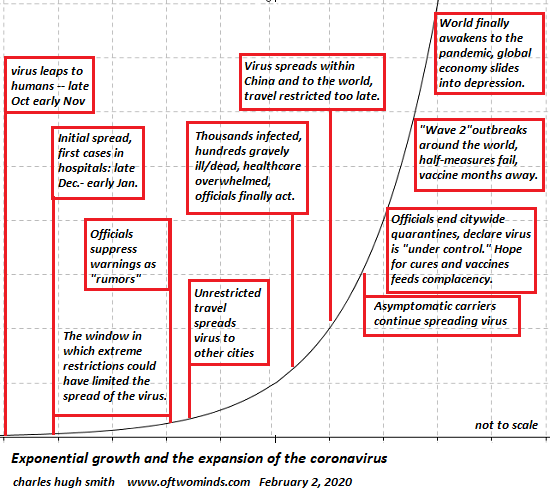Force cannot restore legitimacy, trust or confidence, nor can it magically erase the consequences of a still-unfolding national trauma.
The Chinese authorities threatening to punish workers who refuse to return to work are getting a lesson in the limits of force in an unprecedented national trauma: a bayonet in the back will not restore the legitimacy and confidence that have been lost.
There are two enormous blind spots in conventional media coverage of the pandemic:
1. The limits of force in restoring China's economy to pre-pandemic levels.
2. The longer term (i.e. second-order) consequences of the immense trauma experienced by the Chinese people.
While the media focuses on questionable statistics and economic claims--factories are already back to 60% capacity, etc.-- little attention has been paid to the tremendous losses. For me, a photo of a young woman weeping inconsolably as the body of her mother was unceremoniously hauled away to the crematorium crystallized the cost, the losses and the national trauma.
For this was not the first tragedy of the pandemic to befall this young person; her father had also died 20 days earlier of the coronavirus. This young person lost both parents in the space of a month to the pandemic.
Everyone knows the Chinese government uses statistics to fashion positive political optics of the Chinese Communist Party (CCP).
But for secrets and lies in service of political optics to have unleashed the virus on the entire nation--that is beyond the usual official rigging of statistics to serve Party optics. It is a complete betrayal of the Chinese people, and betrayal has long-lasting consequences.
Once trust, faith in institutions and confidence are lost, they cannot be recovered without much time and many small good faith steps; even one further betrayal will destroy whatever has been slowly regained.
Beneath the surface, confidence has been eroding for years. Despite the "permanently positive news" of bogus GDP statistics, China's economy has been stagnating for the past few years, and the trade war was not the primary cause: unnoticed by a myopic Western financial media, China's economy has shifted from a dependence on increasing production and direct foreign investment (FDI) to a largely hidden dependence on speculation.
Companies don't have earnings from production, they have gains from speculating in debt and the stocks of other companies. Households aren't getting wealthier because they're producing more but because their real estate holding are rising in what's been presented as a permanently expanding housing bubble.
This is one of the hidden costs of sacrificing reality to serve political optics: the average person has sensed the stagnation, but they've had little appreciation of the increasing fragility that left China's pre-pandemic economy exquisitely vulnerable to an external shock.
The collapse of confidence has weakened the power of authorities' threats. Trauma dulls the normal fear of punishment, as the pandemic's punishments have stripped the traumatized of fear.
The limits of over-stretched authorities' powers are also becoming visible. If 40% of a factory's workforce doesn't show up when ordered to do so, are there sufficient police to search for workers who returned to their home villages 1,000 kilometers away and put a bayonet in the back of each one? And then what? Will police officers be assigned to watch the workers 24/7 so they can't escape? The practical limits on force are increasingly apparent.
And what about the borrowing and spending China's economy has become dependent on for growth? Will bayonets be shoved in the backs of potential borrowers to make sure they sign loan documents? Will bayonets be shoved in the backs of potential buyers of empty flats in empty buildings in ghost cities?
Will a bayonet in the back of a flat-broke small business owner pay his overdue rent?
Force cannot restore legitimacy, trust or confidence, nor can it magically erase the consequences of a still-unfolding national trauma. The limits of force apply not just to China but to every national elite that reckons it can force the genie back in the bottle and magically restore legitimacy, trust and confidence to pre-pandemic levels.
Trauma has consequences, and they don't disappear in a matter of days or weeks. Rather, these consequences unleash consequences of their own, i.e. second-order effects, that are beyond the reach of propaganda or force.
When force fails, threats lose their potency and whatever shreds of legitimacy, trust or confidence that survived the trauma evaporate.
A bayonet in the back doesn't restore the confidence of the traumatized, especially when the pandemic is still expanding globally.

Audiobook edition now available:
Will You Be Richer or Poorer?: Profit, Power, and AI in a Traumatized World ($13)
(Kindle $6.95, print $11.95) Read the first section for free (PDF).
Will You Be Richer or Poorer?: Profit, Power, and AI in a Traumatized World ($13)
(Kindle $6.95, print $11.95) Read the first section for free (PDF).
Pathfinding our Destiny: Preventing the Final Fall of Our Democratic Republic ($6.95 (Kindle), $12 (print), $13.08 ( audiobook): Read the first section for free (PDF).
The Adventures of the Consulting Philosopher: The Disappearance of Drake $1.29 (Kindle), $8.95 (print); read the first chapters for free (PDF)
Money and Work Unchained $6.95 (Kindle), $15 (print) Read the first section for free (PDF).
If you found value in this content, please join me in seeking solutions by becoming a $1/month patron of my work via patreon.com.
If you found value in this content, please join me in seeking solutions by becoming a $1/month patron of my work via patreon.com.
NOTE: Contributions/subscriptions are acknowledged in the order received. Your name and email remain confidential and will not be given to any other individual, company or agency.
Thank you, Brendon B. ($100), for your outrageously generous contribution to this site -- I am greatly honored by your support and readership.
|
Thank you, John K. ($150), for your beyond-outrageously generous contribution to this site -- I am greatly honored by your steadfast support and readership.
|
